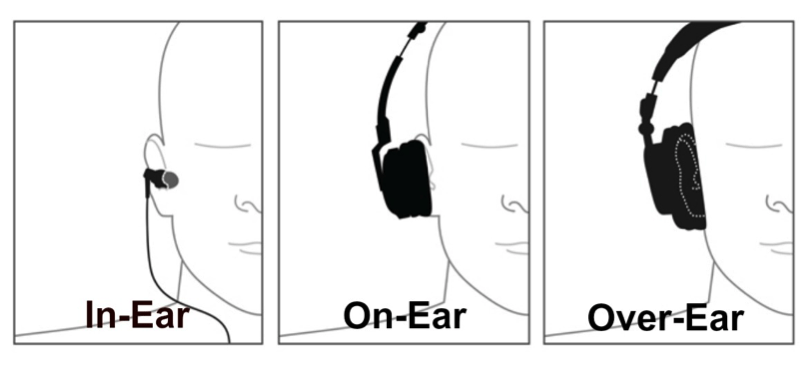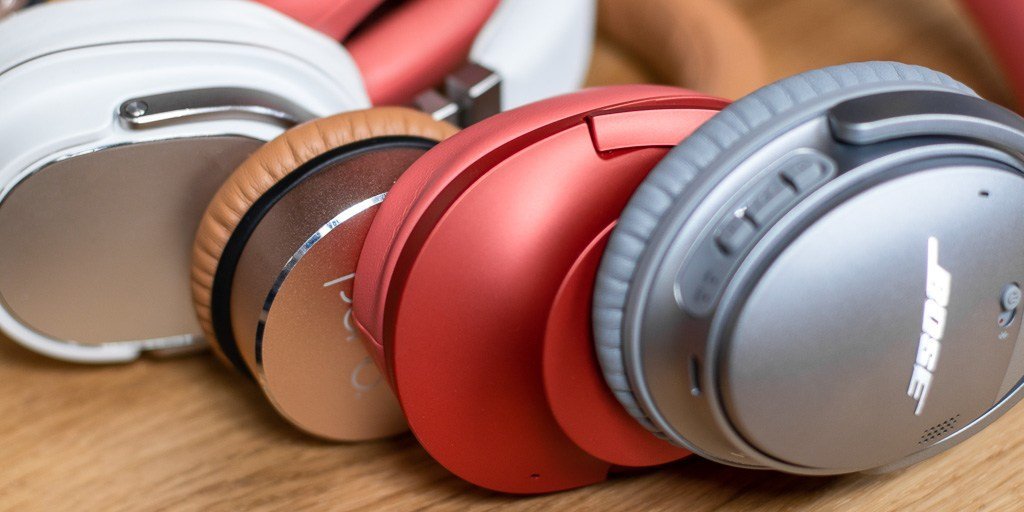The range of headphones is so wide, that it makes it difficult to make a choice when you are shopping for new ones. In this blog post, we are going to break down the basics for you, so that you can easily find the headphones that suit you best. Here are 4 fundamental questions you have to ask yourself, before purchasing:
- How do you want to wear your headphones?
There are three types of headphones. You can opt for earbuds, over-the-ear headphones, and on-ear headphones. The earbuds are also called In-Ear earbuds because you wear them in the ear. The over-the-ear and on-ear headphones are larger. The different types of headphones determine listening comfort, which is why it is important to choose headphones that suit your lifestyle.

In-ear earphone
If you don’t want impressively large headphones, but still enjoy (premium) sound? Then choose earplugs. They are practical due to their size and weight. Easy to carry around and store. They come in different sizes but always stay firmly in your ear. There are different earplugs: special sports earplugs, wireless, with noise canceling and waterproof.
Over-ear headphones
With an Over-Ear headphone, the earcup falls over the ear, so you are sealed off from ambient noise. The great advantage is that you do not have to turn up your volume to be able to hear every beat (good for your ears!). Also, with an Over-Ear design, you get less hearing damage to your ears after prolonged listening.
On-ear headphones
With an On-Ear headset, the earphones fall from the headphone onto the ear, rather than over it. The cushions on the ear cups are always soft, so you can keep listening for hours. With On-Ear headphones, not all environmental sounds are covered. These are handy and safe if you want to put your headphones on in traffic or at work.
- What do you want to use it for?
Now that you know what types of headphones there are. It is also important to look at the activities for which you want to use the headphone. For example, there are models optimized for studying, for audiophiles, fashion headphones and headphones for sports, travel, and gaming. We have briefly summarized the various uses below.
Professional use
If it’s all about clear top sound with accurate reproduction, choose headphones that produce perfect Hi-Fi sound. We use the term High Fidelity for a sound that is close to the original. You hear every tone, note and sigh through a huge frequency range. And Hifi headphones do not always have to come at a high price; they are available in all shapes, types, and price ranges.
DJ
As a DJ, your attributes determine your performance. That is why you also want a good headphone specially designed especially for DJs. A high quality, robust design, crystal clear sound, swivel ear cups, insulation and also a coiled cord is useful.
Fashion
It is obsolete that headphones are only used to listen to music. A headphone is a lifestyle item that can express and even enhance your personality. That’s why you can choose headphones that match your style. You can easily find these in our special range of fashion headphones. This not only looks beautiful and stylish, but you also get a good sound!
Sport
Do you want to listen to music while exercising? Then we recommend opting for special sports earplugs. Sports earplugs stay firmly in place, regardless of your movements. This can be done by an ear hook, a rotating system or special attachments. They can also withstand sweat and moisture. There are also wireless sports earplugs so that you are not bothered by cords during exercise. The award-winning engineers at xFyro audio created the most advanced pair of waterproof earbuds on the market, bringing next-generation technology today’s active listener.
Traveling
When people are on the move a lot and enjoy traveling, music is the ideal travel companion. We advise you to opt for headphones with noise canceling. Then the ambient sounds are filtered out and you, therefore, hear no traffic noises or telephone calls from people around you.
Gaming
You are one step ahead of your opponents when you hear them coming and determine the location of the sound. That is possible with a good gaming headset. You want to be able to play for hours, so comfort is a keyword when choosing a gaming headphone set. A microphone is often a requirement and may also be noise canceling and 3D sound.
Children
A solution for many parents: With a special children’s headset, parents are not bothered by annoying sounds and the child’s ears listen to the music safely. The headphones are, in fact, equipped with a volume limiter.
- What should the headphones be able to do?
Do you want to listen to music wirelessly?
When you choose a wireless headset, you will never be bothered by an (always too short!) cord. You then stream the music via Bluetooth from your smartphone or tablet to the headphones. Super handy for on the road, at home or for sports.
Do you want to make hands-free calls and operate your music?
A large part of the headphones and In-Ears has a universal remote control and microphone in the cord. You can use it to control your music and make phone calls hands-free.
Do you want the headphones to be water resistant?
In this case, water-resistant means ‘splash-proof’: They can withstand moisture and sweat but are not suitable for being fully submerged in water. This feature is especially important for people who use their headphones for sports since you will sweat, but you can also walk through the rain with water-resistant headphones.
Do you want to protect your hearing while listening?
Once you have sustained hearing damage, it is no longer curable and therefore permanent. Our advice is to take this into account while listening. If you are afraid of hearing damage, choose headphones with noise canceling. When you are in a noisy environment (such as by bike or train), you are often inclined to turn up your volume so that you can hear your music well. A noise-canceling headset already filters out these disturbing sounds, so you don’t have to turn up your volume. In addition, you can also close your passive with an Over-Ear, where only the ear is closed or an In-Ear, where the ear canal is closed passively.
- What do all these specifications mean?
Frequency range
The frequency range indicates the lower and upper values that the headphone can display, with the low frequencies providing the low sounds (such as the bass) and the high ones for high sounds (such as treble). A person’s hearing is between 20 Hz and 20 kHz. You cannot hear everything above, but you can feel it. And it certainly influences the timbre. We, therefore, recommend that you use the widest possible frequency range if you use the headphone professionally.
Noise canceling
Noise canceling is the cancellation of ambient noise. This can be done passively, by In-Ears closing the ear canal for ambient noise and Over-Ear headphones closing the ear. But there are also headphones with active noise canceling, a special technique that detects ambient noise and then filters it out (sometimes up to 95%!). You will then only hear your music.
Wireless (Bluetooth)
Different techniques are used to make wireless contact between the playback device and the headphones or earbuds, allowing you unlimited freedom of movement. Bluetooth is used the most. Simply put, Bluetooth is a radio connection for data and sound at a short distance. Almost all smartphones have this function on board. Near Field Communication makes it possible to simply hold your tablet or smartphone against your headphones to make a connection, just as public transport chipping also works. Remember that you have to charge the headphone.
Microphone
Many headphones have a microphone, which makes calling with the headphones or earbuds possible and easy. It is incorporated in the cord or with a Bluetooth headset in the earcup. Make sure that your smartphone is compatible with the connection options of the headphone, otherwise, the microphone may not work. Gaming headsets also have a microphone: To optimize the outgoing sound, some headphones have a microphone with noise canceling.
Connection
A headphone is connected to audio equipment with a plug – unless it is a wireless headphone. There are two standard sizes: 3.5 mm (most common) and 6.3 mm diameter jack plug (more expensive audio equipment). Sometimes the 2.5 mm plug can still be found with cheap MP3s, but the number of headphones for this is limited, which means that an adapter plug to 3.5 mm must be used in order to be able to listen.
Detachable cable
Detachable certainly does not always mean that you can also listen to music wirelessly. Disconnecting the cable from the headphones can be useful if it is broken: it is cheaper to replace a cable than to purchase a whole new headset.
Closed vs. Open shell
An open sound box lets in more ambient noise, which is safer if you actively participate in traffic. A closed shell leaves little or no environmental noise, which is useful when you are in noisy situations, such as the train or at work.
Rotating shells
This function is especially important for DJs: Turning and tilting not only ensures the best position on your head or neck, but you also want to be closed one moment and focus on the music and hear the whining from the audience the next moment. Or that both at the same time.
High Resolution
Hi-Res (also called Hi-Fi) offers higher sampling rates, allowing you to enjoy the original sound without the loss of quality. Sound is not reduced (as is the case with MP3) so that all details remain audible. The frequency range is often huge. Make sure that you also stream or download Hi-Res music for optimum results.
Impedance
This is about resistance and is expressed in ohms. Impedance indicates how much energy the headphones require from the source, such as your smartphone. The higher the impedance, the more energy the headphone requires. The source must be able to handle this. For example, if you buy a 300-ohm Hi-Fi headset, it makes no sense to connect it to your mobile, because then the headset will not come into its own. Amplifiers can offer a solution here. That way you get the most out of your headphones.
We hope that these tips have helped you to decide which pair of headphones you want to purchase!









